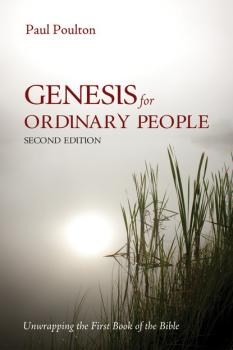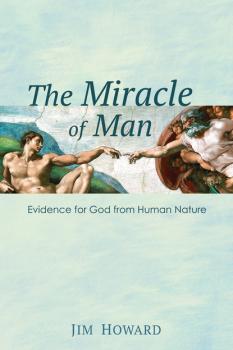MREADZ.COM - много разных книг на любой вкус
Скачивание или чтение онлайн электронных книг.Genesis for Ordinary People, Second Edition
The book of Genesis is considered by some people to be inspired, truthful, and sacred. Others think of it as a fairy story and wonder why people still believe such an ancient book. Genesis for Ordinary People doesn't shy away from the questions that go through people's minds as they read the first book in the Bible. Are there reasons it is trustworthy? In addressing these questions, Paul Poulton follows the intriguing thread that runs through the entire book of Genesis. He takes a good look at the story's wonderful (and flawed) people and beings, inviting readers to gaze into the garden of Eden to witness the reality of what actually happened there. He follows the storyline of Genesis but often looks back, adding a fresh perspective to Adam and Eve's enthralling lives. A fascinating picture emerges as the layers of Genesis accumulate.
The Miracle of Man
What Is a Man? Biologically, we are animals–homo sapiens. But men are different, born with consciousness, reason, free will, notions of morality, and other characteristics of what we call «human nature.» Why are we different? Were we created by God or are we just accidents of nature? Are you a child of the King or just a child of King Kong? This is a book of apologetics for laypeople. It looks at arguments for the existence of God and especially at those arguments that can be drawn from human nature. It argues in plain language, with illustrations and humor, that we cannot explain human nature without God, that men are miracles.
The Last King of Israel
As death draws near, life will be lived differently. The Last King of Israel explores how the king of kings chose to live his final ten days culminating in the resurrection. Lessons like spending time with loved ones, dealing with difficult people, handling criticism, resting despite enormous stress, and handling affliction are some of the areas addressed as Jesus faces imminent death. Easter is one of the world's most revered holiday seasons; this book will enhance understanding of this truly holy week. Including the two days before Palm Sunday and continuing through the evening of his resurrection, The Last King of Israel takes the reader on Jesus's epic final ten-day journey as his mission on earth comes to an end. Seeing how he died will teach all of us how to live. Challenging both the heart and the mind, The Last King of Israel is a must-read for those who desire a deeper understanding of who Jesus is and the life he lived.
Handbook of Biblical Social Values, Third Edition
Values are culturally specific. This handbook explains select biblical social values in their Mediterranean cultural contexts. Some examples of values are altruism, freedom, family-centeredness, obedience, parenting, and power. Though the English words for the values described here would be familiar to readers (e.g., altruism) the meanings of such words differ between cultures. In the Mediterranean world, for instance, altruism is a duty incumbent upon anyone who has surplus. It is interpersonal and group specific. In the West, especially in the United States, altruism is impersonal and universally oriented generosity that operates in a highly organized context. This handbook not only presents the Mediterranean meanings of these value words but also contrasts those meanings with Western ones.
Unlocking the Puzzle
A shorter, simpler first draft of the Gospel of Mark has been theorized by New Testament scholars for almost two hundred years. Using literary tools, David Oliver Smith strips away interpolation and redaction from the canonical Gospel to reveal that long-sought first draft–the Original Gospel of Mark. Original Mark, shorter than the canonical version and with several large blocks of text replaced in their original locations, reveals a coherent structure and a different picture of who Jesus is. But it is anything other than simple. The Original Gospel also presents puzzles for the curious reader of Mark to solve, and Smith has found the keys to their solution. Analysis of the text that was interpolated into Mark reveals who that redactor might have been. Evidence is presented that it was the author of the Gospel of Luke who redacted the first-written Gospel, jumbled its structure, and changed its Christology. Follow the analysis of literary structures created by the genius who wrote Mark's Gospel and discover the astounding design of the Original Gospel of Mark.
The God Who Prays
The God Who Prays is a spiritual reading of Jesus' farewell prayers. Jesus began his upper room discipleship sermon on his knees, washing the disciples' feet, and he ended it with his eyes raised to heaven, consecrating himself and his disciples to the will of the Father. For Jesus the line between communion with his Father and conversation with his disciples is very thin. Dialogue and devotion go hand in hand. His Glory prayer and his Gethsemane prayer, along with his prayers from the cross, transform the disciples from pre-passion inquisitiveness and doubt to post-passion devotion and discipleship. Through answered prayer Jesus shifts the disciples from training mode to mission. His example inspires us to ask how thin the line is between praying and living. Prayer's promised efficaciousness, «whatever you ask,» is locked in to our relationship with the triune God. The Father is the source of every good and perfect gift. The Son, in whose name we pray, gives the purpose and the passion for «whatever» we ask. And our Advocate, the Holy Spirit, guides us into all truth. On the eve of the crucifixion Jesus teaches us how to pray.
Holy Fire Fell
Why do we worship as we do? What are the forgotten practices once central to many early Nazarene congregations? Because historical events and other factors have shaped and molded the various worship patterns found in local congregations, the way in which contemporary Nazarenes worship is no accident. Like other descendants of the American holiness movement, Nazarene worship is influenced by events predating our denominational forebears. This text explores the history behind current worship trends for a crucial reason: the very act of worship shapes and forms worshipers. Beliefs and attitudes are forged not merely by what is heard from the pulpit, but also by what is done bodily in the pew. Ellis examines the liturgical concerns and practice of John Wesley as well as those of early Nazarene pioneers in an attempt to address these issues. In so doing, the book provides a historical resource for denominational leaders, pastors, and congregations. At the same time, it aims to help congregations both to appreciate our rich ecclesial history and to critically evaluate current worship practices in order that they may truly be transformational.
Big Picture Parents
Being a parent in the modern world is tough. We are often overwhelmed with fear about damaging our children, guilt about our imperfections, and confusion about our role. Harriet Connor knows these feelings well. But hers is not just another parenting book full of «shoulds and shouldn'ts» to make you feel worse. Rather, she invites you to step back and consider the bigger picture:
What is the purpose of life and parenthood? What are our human limitations? How can we cope with our guilt and fear? What are our family's values and how do we pass them on? What is our family's structure and place within the wider community?
When she was desperate for answers, Harriet Connor turned to the ancient wisdom of her ancestors–the Bible. She went looking for little pieces of grandmotherly advice, but what she found was a grand vision–a big picture–that made sense of both life and parenthood.
Whether you are new to the Bible or have read it before, you will not regret taking time to reflect on its message, which has given comfort and guidance to generations of parents just like you.
The Presbyterian Philosopher
This is the story of Gordon Clark (1902-85), respected philosopher and prolific writer, who held that Christianity, as a logically coherent system, is superior to all other philosophies. Clark fought no wars and conquered no kingdoms. Yet he was a leading figure in many theological wars fought for the Kingdom of God. These battles for the minds and souls of men were every bit as crucial as physical wars between nations.
In an age of increasing secularization, he put up an intellectual defense of the Christian faith. This faith, he believed, was a system. All of its parts link together, a luxury of no other philosophy. His stance shows a Christianity that is in fact intellectual, not relying on appeals to emotion or experience.
In propounding this view, he encountered frequent opposition, not from the secular world, but from within his own denomination. This biography helps explain why his thought was so profound, why resistance mounted against him, and how his struggles impacted American Presbyterianism. Additionally, this book calls for a reappraisal of Clark's views, which have been maligned by controversy. Understanding and applying his views could significantly fortify Christians combating irrational and non-systematic ideas prevalent in today's churches.
Justified in Christ
Analyzing and comparing the doctrines of justification held by a legendary nineteenth-century Catholic, John Henry Newman, and an Italian hero of the Reformation, Peter Martyr Vermigli, this book uncovers abiding opportunities, as well as obstacles at the Catholic-Protestant divide. These earnest scholars of the faith were both converts, moving in opposite directions across that divide, and, as a result, speak to us with an extraordinary degree of credibility and insight. In addition to advancing scholarship on several issues associated with Newman's and Vermigli's doctrines, and illuminating reasons and attendant circumstances for conversion across the Tiber, the overall conclusions of this study offer a broader range of soteriological possibilities to ecumenical dialogue among Roman Catholics and Reformed Protestants by clarifying the common ground to which both traditions may lay claim.









